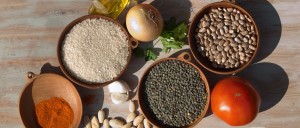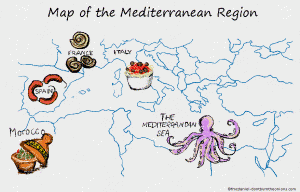 The Mediterranean Diet is one of the most vibrant and creative combinations of flavours, colours and ingredients in the world. Many internationally renowned recipes originated there such as pizza margherita, paella and ratatouille.
The Mediterranean Diet is one of the most vibrant and creative combinations of flavours, colours and ingredients in the world. Many internationally renowned recipes originated there such as pizza margherita, paella and ratatouille.
The vast area, defined by the straits of Gibraltar in the East and Syria and Lebanon in the West, plays host to 21 different countries each with their distinct culinary history, style and traditions.

Some foods are identified with specific countries-pasta with Italy, chorizo with Spain and couscous with Morocco.
Common to them all is the use of fresh, seasonal, local ingredients, many of which have come to characterise the region, such as:
olives and olive oil, peppers, tomatoes, aubergines, garlic; lemons and oranges;
almonds and other nuts;
sesame,sunflower and other seeds; beans and pulses such as lentils, chickpeas
abundant use of fish and seafood such as squid, octopus and sardines;and herbs and spices such as oregano, bay, saffron and cumin.
Scientific endorsement
There is more to the Mediterranean Diet than simply a collection of popular dishes or ingredients. It is now also considered one of the healthiest ways to eat by the scientific and medical establishment. Ever since the landmark Seven Countries study published in the eighties and the Lyons study in the nineties, mounting scientific evidence has revealed that typical Mediterranean ingredients such as garlic and olive oil can help in the battle against serious diseases like cancer and also ease symptoms of chronic conditions such as arthritis. Scientific and health institutions around the world also recommend the diet in the fight against rising obesity and related conditions.

Did you know that UNESCO has given official recognition to the Med diet’s contribution to a healthy lifestyle? On awarding it a Cultural Heritage listing, UNESCO summed up the diet as follows: “The Mediterranean Diet is classified by employing ten principles, which include using olive oil; eating plenty of fruit and vegetables (plus legumes and nuts); bread and grains; fresh, local, unprocessed foods; dairy products on a daily basis; moderate red meat, eggs and wine; plenty of fish and poultry; and lots of water.”
“Plus the social aspect of eating communally; associated traditional songs, rituals and celebrations; and farming and fishing practices. It is claimed that the diet, rich in fibre and vitamins and low in fat, can reduce risk of various health problems, including obesity, asthma, diabetes, arthritis, cancer and heart disease, as well as boosting life expectancy.” (http://www.unesco.org/culture/ich/RL/00394)
For lots of ideas on Mediterranean style dishes that are easy to cook yet full of flavour and colour, click here
Please feel free to contact me with any queries or suggestions.
© (Suzette McDaniel Don’t Burn The Onions) Unauthorized use and /or duplication of this material without express written consent from this blog’s author/and or owner is strictly prohibited.


Hi! It was great to read your comments and to read that you and your husband are fans of the Med Diet. Think you summed it up brilliantly by the way, so many thanks for your contribution! Best wishes 🙂